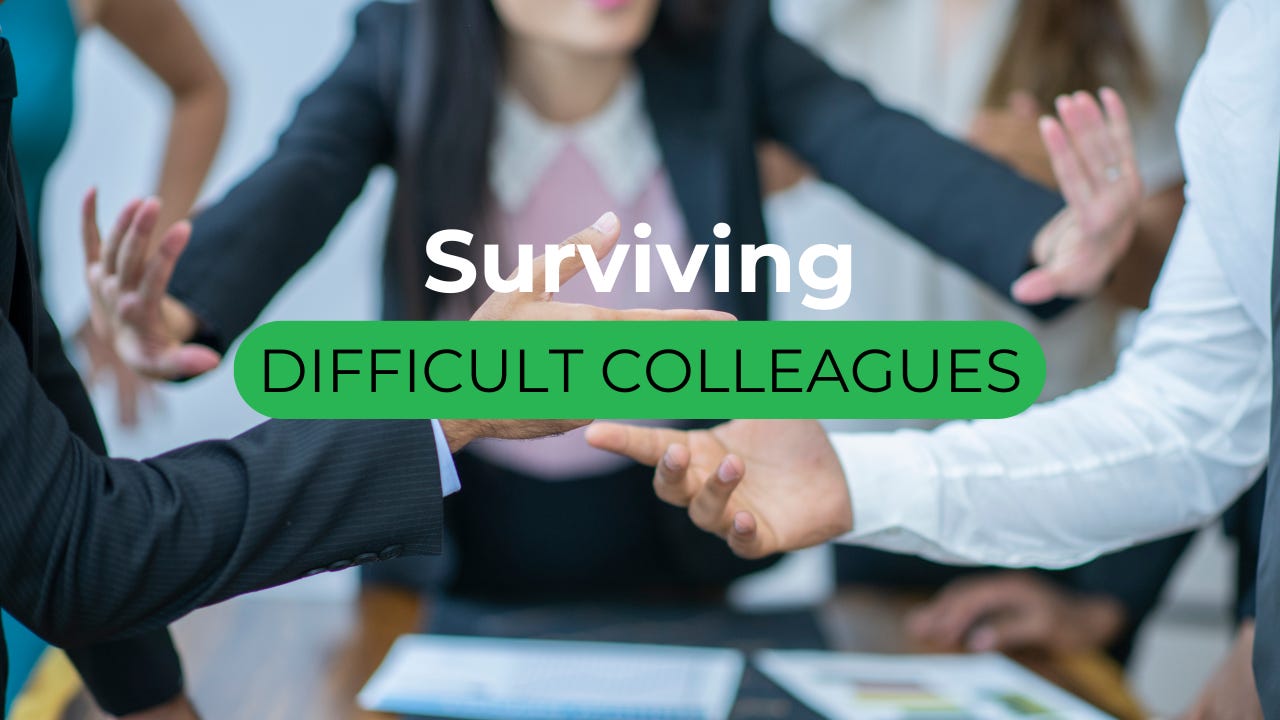Surviving (and Even Thriving) with Difficult Colleagues
Let's face it: We've all worked with someone who grates on our last nerve.
Remember that time you almost strangled your keyboard during a meeting with... that person? Workplace dynamics can be complex, and disliking a colleague is not uncommon. But mastering the art of professional coexistence is crucial for career success. While it might feel impossible, navigating these relationships effectively is not just about surviving – it's about thriving in a collaborative environment. By focusing on genuine connection and demonstrating a genuine liking for others, you can transform challenging relationships and foster a more positive work experience.
The Power of "Showing You Like"
People are naturally drawn to those who show genuine interest in them. By demonstrating that you like and value your colleagues, you create a more positive and collaborative environment.
Active listening: Pay attention to what they say, ask thoughtful questions, and show genuine interest in their ideas and perspectives.
Empathy and understanding: Try to see things from their point of view, even if you don't agree with them.
Genuine appreciation: Express sincere gratitude for their contributions and support.
Small gestures of kindness: Offer a helping hand, bring in treats, or simply acknowledge their presence with a friendly greeting.
Building genuine connections can lead to increased trust, improved communication, and stronger collaborations.
Likeability is a Two-Way Street
Likeability isn't just about being nice. It's about being genuine, authentic, and understanding. It's about knowing yourself and how you come across to others. It's about being able to listen actively, empathize with others, and communicate effectively.
When you're self-aware, you're better able to understand how your words and actions might be perceived by others. You can be more mindful of your body language, tone of voice, and word choice. You can also be more open to feedback and willing to adjust your approach as needed.
When you're empathetic, you can put yourself in the other person's shoes and see things from their perspective. You can validate their feelings and experiences, even if you don't agree with them. You can also show genuine interest in their ideas and opinions.
By developing these skills, you can improve your relationships with others and create a more positive and productive work environment.
The Power of "Giving to Get"
Often, the more we genuinely try to like someone, the more likely they are to reciprocate.
Find common ground: Look for shared interests, hobbies, or even just a mutual appreciation for good coffee.
Offer sincere compliments: Acknowledge their strengths and contributions.
Go the extra mile: Offer to help on a project, even if it's outside your immediate responsibilities.
Developing Essential Workplace Skills
Navigating challenging relationships requires developing essential workplace skills. Clear and assertive communication can help you express your concerns professionally. When conflicts arise, focus on finding solutions and avoid assigning blame. Remember to set healthy boundaries to protect your well-being and productivity. By honing these skills, you'll be better equipped to handle difficult situations and maintain positive working relationships.
Maintaining Professionalism
Remember to maintain professionalism at all times:
Focus on the task at hand: Let personal feelings remain separate from work performance.
Avoid gossip and negativity: Engaging in negative talk about colleagues can damage your own reputation.
Seek support: Talk to a mentor, trusted colleague, or HR representative if you're struggling.
By focusing on genuine connection and demonstrating a genuine liking for others, you can transform challenging relationships and foster a more positive and fulfilling work experience. Remember, likeability is a two-way street. Making an effort to like others can improve relationships, and developing essential workplace skills is crucial for navigating any professional situation.



